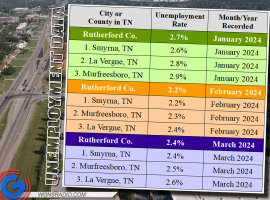Earlier this month, the House passed House Bill 2371 ending the practice of forced annexation in Tennessee. Its companion bill, SB2464 sponsored by Senator Bo Watson, also passed, and both bills were signed into law by Gov. Haslam this week. As introduced, the bill abolishes annexation by ordinance at the initiative of the municipality.
According to Jason B. Bour, candidate for Rutherford County Commissioner of the 9th District, this could not have been accomplished without the grassroots efforts of organizations such as “Tennesseans Against Forced Annexation”, and “Right 2 Vote Tennessee”, and the involvement of the people in the Great State of Tennessee.
This bill repeals a 1955 law that allowed cities to annex property just by passing an ordinance.
The passing of this bill extends the moratorium on annexation that was put into place April 15, 2013 to May 15, 2015. The bill will become law May 16, 2015
Read about the bill:
Under present law, a municipality may extend its corporate limits by annexation of territory adjoining the municipality's existing boundary. The municipality may take such action:
(1) When petitioned by a majority of the residents and property owners of the affected territory; or
(2) Upon its own initiative, by an ordinance, when it appears that the prosperity of such municipality and territory will be materially retarded and the safety and welfare of the inhabitants and property endangered, after notice and a public hearing, by ordinance.
This bill removes the municipality's authority to annex a territory by ordinance upon its own initiative and removes other provisions governing such process.
ON MARCH 27, 2014, THE SENATE ADOPTED AMENDMENT #2, AS AMENDED BY AMENDMENT #1 TO 2, AND PASSED SENATE BILL 2464, AS AMENDED.
AMENDMENT #2, as amended, rewrites the bill. Under present law, no municipality may extend its corporate limits by means of annexation by ordinance upon the municipality's own initiative from April 15, 2013, through May 15, 2014. This amendment changes the end date of this moratorium to be whatever date this bill becomes law.
Under present law, if a municipality formally initiated such an annexation prior to April 15, 2013, and if the municipality would suffer substantial and demonstrable financial injury if such ordinance does not become operative before May 15, 2014, then the municipality may submit a petition prior to such date and the county legislative body may waive the restrictions by a majority vote. This amendment revises the applicable end date to be this bill's effective date.
This amendment adds that from the effective date of this bill, through May 15, 2015, no municipality may extend its corporate limits by means of annexation by ordinance, or by resolution and no annexation will become operative during such period, unless otherwise permitted pursuant to: a hardship provision, similar to the one discussed above whereby the municipality would suffer substantial and demonstrable financial injury; provisions of a comprehensive growth plans (as discussed below); or consent of the owner or owners of the property.
Present law required the Tennessee advisory commission on intergovernmental relations must make a review and evaluation of the efficacy of state policies on annexation and comprehensive growth plans, and to submit its findings and recommendations to the speakers of the house and senate by January 14, 2014. This amendment extends the study and requires a report by February 15, 2015.
This amendment removes the laws governing annexation by ordinance for municipalities, except for those provisions discussing plans of services, including the requirement that such a plan must be adopted before any territory may be annexed by ordinance and the provision requiring the county mayor, after receiving the required notification from the municipality, to notify the appropriate departments within the county regarding the information the mayor received from the municipality.
Under present law, a municipality may, upon petition by interested persons or its own initiative, by resolution propose extension of its corporate limits by annexation of adjoining territory. This amendment adds that no such resolution may propose annexation of any property being used primarily for agricultural purposes. Property being used primarily for agricultural purposes may be annexed only with the written consent of the property owner or owners. A resolution to effectuate annexation of any property, with written consent of the property owner or owners, will not require a referendum.
This amendment adds that any county having a metropolitan form of government may expand the area of its urban services district using any method authorized by its charter. Such expansion may also be accomplished using any method, identified by charter reference to general annexation law, that was applicable at the time the charter or amendment was approved by referendum.
In regard to the comprehensive growth plan provisions of present law, this amendment adds that a municipality may expand its urban growth boundaries to annex a tract of land without reconvening the coordinating committee or approval from the county or any other municipality if:
(1) The tract is contiguous to a tract of land that has the same owner and has already been annexed by the municipality;
(2) The tract is being provided water and sewer services; and
(3) The owner of the tract, by notarized petition, consents to being included within the urban growth boundaries of the municipality.
This bill will take effect on becoming law, except that the changes to the annexation laws discussed above in paragraphs five and six of this summary will take effect on May 16, 2015.












